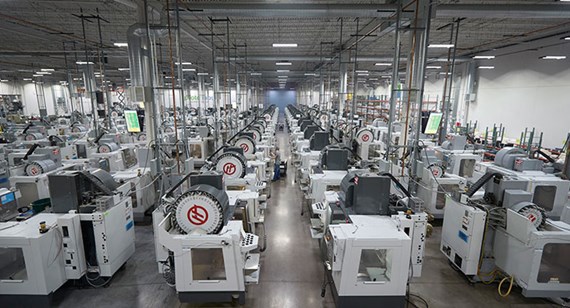Manufacturing is changing. There, we said it.
In the past, manufacturing was all about mass production and economies of scale. However, the future is looking very different. The rise of digital technologies, shifting consumer demands, and the need for sustainability are driving a transformation in the industry.
So, how are manufacturers adapting? Let's break down some of the key trends.
Digital Transformation: The Game Changer
Digital transformation is at the heart of modern manufacturing. Advanced technologies like Artificial Intelligence (AI), digital twins, and big data analytics are being integrated into every aspect of production as part of the Internet of Things (IoT) movement. This isn't just about automating tasks; it's about creating smart, interconnected systems that optimise themselves in real time.
Imagine a factory where machines communicate with each other, predict maintenance needs, and even adjust production schedules based on real-time data. This level of sophistication leads to greater efficiency, reduced downtime, and cost savings.

Customisation and On-Demand Production
Gone are the days of one-size-fits-all products. Today's consumers expect personalised, on-demand solutions. This shift requires manufacturers to be more flexible and responsive than ever before.
How can they achieve this? By leveraging advanced manufacturing technologies like 3D printing, CNC machining and rapid Injection Moulding. These tools allow for rapid prototyping and small-batch production, making it easier to meet unique customer needs without lengthy lead times.

Sustainability: A Non-Negotiable Priority
Sustainability is no longer a buzzword; it's a critical consideration for any forward-thinking manufacturer. Reducing waste, minimising carbon footprints, and using renewable resources are all part of the equation.
But sustainability isn't just good for the planet; it's good for business. Consumers are increasingly choosing brands that prioritise environmental responsibility. By adopting sustainable practices, manufacturers can boost their brand image and attract eco-conscious customers.
Building a Resilient Supply Chain
Recent global disruptions have highlighted the importance of supply chain resilience. Manufacturers must build more robust and flexible supply chains to weather future storms.
This means diversifying suppliers, investing in local production capabilities, and utilising digital tools to gain real-time visibility into supply chain operations. A resilient supply chain isn't just about surviving crises; it's about thriving in a dynamic and unpredictable world. Check out our 5 top tips for strengthening your supply chain.
Protolabs recently commissioned a report through our manufacturing network team that dug deeper into this. A handful of strategic approaches emerged from the research centred around automation, geographical diversification, agile processes, supply chain monitoring, and balancing inventory. For the sake of brevity, let’s focus on three of these:
- Software and hardware automation—from online buying experiences to factory floor production—is key to unlocking resilience to supply chain shocks and driving productivity and efficiency at companies and their suppliers. With the rise of industrial Internet of Things (IIoT) models, automation is more prevalent than ever and can help companies reduce fixed costs and be more adaptive to changing inputs.
- Geographic diversification and onshoring builds a safety net into supply chains. According to the report, nearly 44% of participants cited local sourcing as the most effective way to tackle future supply chain disruptions. A good first step? Leveraging a partner with manufacturing locations around the world.
- Just-in-time manufacturing paired with predictive forecasting to determine accurate reserve inventories balances supply strategies. It allows companies to still implement lean tactics that leverage on-demand production but use data-driven AI models to help determine proper minimum order quantities and avoid disruption in case of crisis—the best of both worlds.

Conclusion: The Future is Now
The manufacturing industry is at a pivotal moment. By embracing digital transformation, prioritising sustainability, building resilient supply chains, and empowering the workforce, product designers and engineers can architect a manufacturing framework ready for the future.
At Protolabs, we’ve been gearing up for this change by adapting our manufacturing model. Our industry has always siloed digital factories and online marketplaces, two models working exclusively to bring a unique set of benefits to companies. Why not combine the two to form a new shared digital manufacturing model that blends the best of both models?
So that’s what we did—We recently established Protolabs Network, a group of distributed manufacturers with wider production capabilities to complement our existing offer. The result? We can now bring you the highest-quality solutions at world-class speeds, with advanced capabilities on tolerances, finishing options and higher volumes at a lower cost, giving you more control over your manufacturing options.
If we examine this shared manufacturing model through the lens of a product’s life cycle, we can highlight the breath of support product designers and engineers can now expect from their manufacturer:
- Product Development: iterative testing, low-volume pilot runs, and design validation in the market
- Introduction & Growth: strategic inventory forecasting, bridge tooling, and onshoring and localisation
- Maturity: higher volumes with steel tooling, advanced capabilities, and reduced production costs
- End of Life: on-demand production for just-in-time (JIT) manufacturing
So, whether you're a seasoned industry veteran or a newcomer, now is the time to innovate and adapt. The future of manufacturing is bright, and it's full of opportunities for those willing to seize them.
For a real-life example, discover how Protolabs’ combined manufacturing solution helped the leading aircraft innovator, Airbus, develop high-performance batteries!










